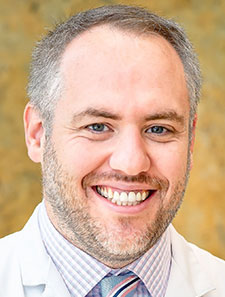In front of a standing-room-only crowd at this year’s SHM Converge, Christopher Russo, MD, MBA, CPE, FAAP, medical director for quality and innovation and director of pediatrics at WellSpan Health in York, Pa., delivered an engaging presentation and set the tone for a lighthearted approach to bring some of the newest ideas from the world of business into the world of hospital medicine.
Drawing from high-impact publications such as the Academy of Management Discoveries, Harvard Business Review, Journal of Marketing Research, and Psychology and Marketing, Dr. Russo plucked lessons from the business world that could reshape how hospitalists lead, communicate, and prioritize their work. While many of us spend our time with our noses in medical journals, Dr. Russo did us the favor of taking on the business journals and translating them for the common hospitalist.
Advice versus opinion: why the framing matters
Dr. Russo began by tackling a behavioral study from Organizational Behavior and Human Decision Processes that revealed a striking finding: people trust feedback framed as advice significantly more than that presented as opinion. In one experiment, participants were more likely to trust and pay up to two times as much for information framed as “advice” versus “opinion,” even when the content was identical.
This has important implications for hospital medicine. Clinicians are often hesitant to provide advice to patients and often default to offering their medical opinion, especially when trying to avoid sounding condescending. But this research suggests that patients are more likely to follow advice. For hospitalists, reframing communication from opinion to advice may be an effective way to increase trust and adherence.
Gratitude in advance improves resilience
In a clever psychological experiment involving distressing and even impossible tasks, participants who were given gratitude in advance, such as a thank you for trying their best, demonstrated significantly more resilience and willingness to continue despite failure.
The takeaway—expressing anticipatory gratitude to colleagues before difficult shifts or patients before challenging procedures can improve outcomes and morale. Gratitude, used strategically, is more than a nicety, but it can be a tool for promoting psychological endurance. Dr. Russo was also careful to make the distinction between motivating colleagues and using psychological research to be manipulative.
Leaders shouldn’t try to do it all
Drawing on Harvard Business Review and classical economics, Dr. Russo revisited Ricardo’s theory of comparative advantage. The lesson—leaders shouldn’t just prioritize tasks based on importance, but instead focus on where they have a unique edge. Tasks you’re merely competent at but don’t uniquely excel in should be delegated or eliminated.
In practical terms, skip meetings where your input isn’t critical. Avoid redundant reviews. Save your bandwidth for the areas where you can make a decisive impact. Hospitalist leaders, Dr. Russo argued, must resist the urge to do everything and instead do what only they can do.
Communicating enjoyment boosts engagement
Multiple marketing studies showed that when professionals explicitly express enjoyment in what they do, it increases perceived value. Whether it was bartenders making cocktails or plumbers describing their work, joy translated into increased willingness to pay and trust from consumers.
Dr. Russo encouraged hospitalists to share their enthusiasm authentically for patient care, teaching, or problem-solving. Doing so not only improves communication but can positively influence patient experience, team morale, and even adherence to care plans. So don’t be afraid of sharing your passion and excitement for guideline-directed medical therapy for all your chronic heart failure patients; it may increase medication compliance!
Rule breakers get rewarded (sometimes)
A fascinating study on hockey penalties revealed a positive linear relationship between minor rule-breaking and total playing time, but only in regular-season games. In business settings, similar findings showed that moderate rule-breakers often received preferential treatment, while extreme deviants were avoided.
In the hospital setting, this presents a challenge. Leaders must be cautious not to inadvertently reward deviance, especially when it becomes normalized. While creativity is valuable, boundaries must be clear, and reinforcement must align with organizational values.
How inspirational leaders stand out
In a quick-hit segment, Dr. Russo outlined four traits that set inspirational leaders apart:
- Be visionary: communicate a compelling picture of the future
- Be exemplary: live the values you promote
- Be a mentor: lift others up with empathy and empowerment
- Stay inspiring: through consistency, clarity, and care
For hospitalists juggling clinical work and leadership responsibilities, these reminders serve as a roadmap for authentic influence.
How to talk about the future
Finally, Dr. Russo shared insights from Psychology and Marketing about how to communicate future expectations. In advertising, positive expectations and negative fantasies both influenced behavior, but in different ways. While positive framing made people want to achieve something, negative fantasies (e.g., imagining poor outcomes) made them act to avoid a threat.
In clinical medicine, this has real application, especially in performance reviews, coaching, or patient counseling. For example, “If you don’t complete your discharge summaries on time, it could affect your credentialing” may trigger more behavior change than generic encouragement.
Dr. Russo closed by summarizing the major lessons:
- Frame feedback as advice, not opinion
- Use gratitude proactively, not just retroactively
- Focus on what only you can do and delegate the rest
- Share your enjoyment of work; it improves engagement
- Be careful about rewarding rule-breaking, even subtly
- Communicate the future with intention; expectations and fears can both motivate
 Dr. Donohue is an adult hospitalist and market medical director for Team Health in LifePoint’s central Kentucky market as well as the chief of medicine at Georgetown Community Hospital in Georgetown, Ky. He serves as the medical director of telemedicine for Team Health’s Strategic Account Group and is a member of SHM’s Community Hospitalist Advisory Board.
Dr. Donohue is an adult hospitalist and market medical director for Team Health in LifePoint’s central Kentucky market as well as the chief of medicine at Georgetown Community Hospital in Georgetown, Ky. He serves as the medical director of telemedicine for Team Health’s Strategic Account Group and is a member of SHM’s Community Hospitalist Advisory Board.